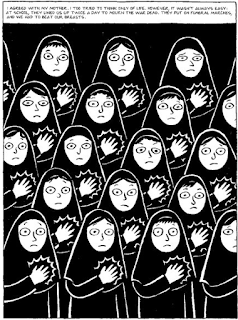Response on Persepolis
I like the point of view and the visual language of Persepolis. In Persepolis, the POV is focused on Marjane herself, making her the main character growing up from childhood to adulthood in the times of war. I like it because it is much more impactful and also entertaining to see the effect of war and pressure of society form a young girl's point of view than history books. It reminds me of the feeling of reading "The Diary of Anne Frank". Both characters are telling their story of living in wartime and from oppression by their leaders.
Persepolis let me understood a lot about Inequality, and lack of freedom, and especially women's rights at the time period. The strong visual and verbal representation used in the graphic novel is very impactful to me.
Visually, I found this panel in page 95 is very impactful. The composition is repetitive, enhancing the fact that every woman is forced to be the same. The mass amount of black used in the image creates a depressing mood and made the sad faces of the characters in focus. The uniformness and the contrast of this panel really help me understand what Marjane feels emotionally as a woman at this point in her life.
Verbally, the author used a lot of harsh and straight to the point language to represent the position of women. For example, at the time when Marjane’s mother is not wearing a veil, the men said women like her should be raped then thrown into the garbage.
I hope that the impactfulness of the images could make more people understand the issue that women were going through and prevent these situations from happening again.

I like how you pick p95 as an example. I read comic, and actually at first I didn't realize that those are different people on p95. I thought they were all one person, and it was a way to show the author's idea. Then I noticed they have different hair styles and finally realized that they are different people and are forcend to be the same. The other point of this part of the story is that they were all kids and they actually didn't understand what they were doing and why they were doing like this.
ReplyDelete